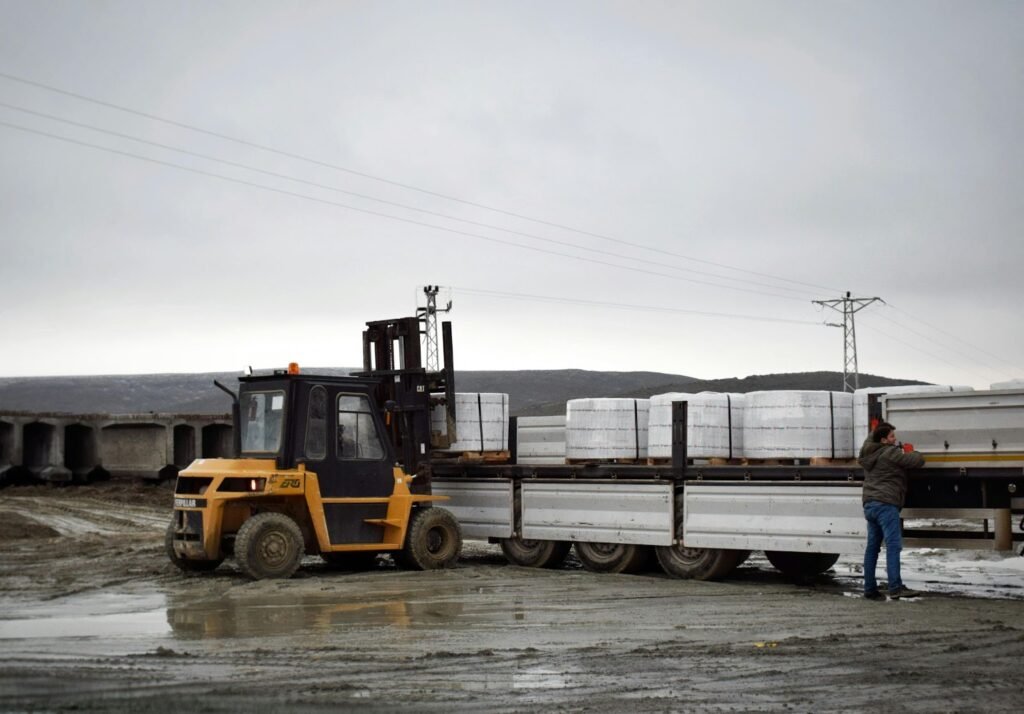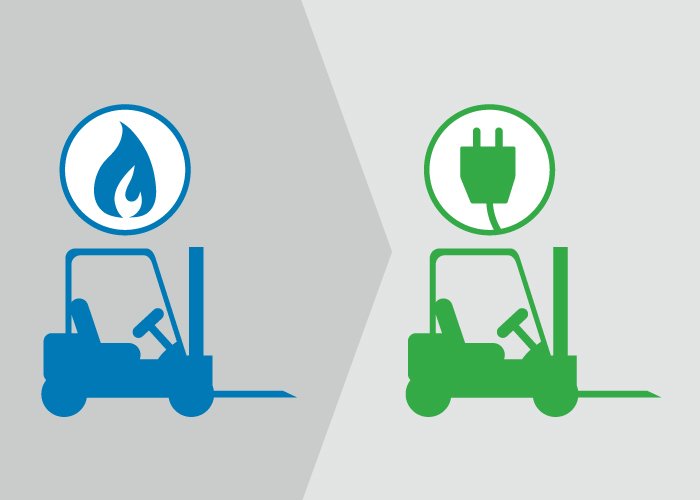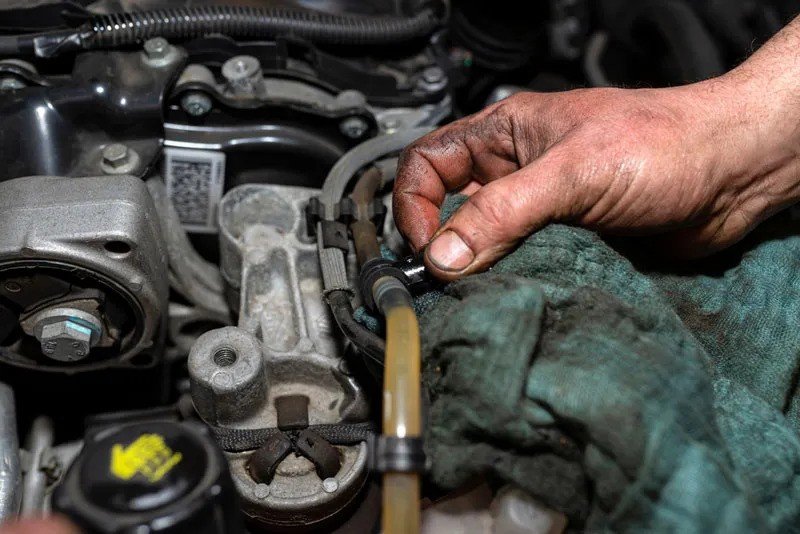Common reasons for a forklift losing power include fuel issues, hydraulic problems, air filter blockages, and battery malfunctions. Regular maintenance, prompt troubleshooting, and addressing these issues can help resolve power loss efficiently and optimize the forklift’s performance.
Forklifts are essential for businesses in Houston, TX, and Humble, ensuring smooth warehouse and industrial operations. However, frequent power loss can disrupt workflow, delay deliveries, and increase maintenance costs. Whether it’s an issue with the fuel system, battery, or air filter, diagnosing the root cause is crucial.
Power loss in forklifts can result from various common issues, including fuel flow restrictions, carburetor malfunctions, electrical faults, or cooling system failures. If left unchecked, these issues can lead to costly repairs and downtime.

At Upright Forklift Repair, we specialize in expert forklift repair, maintenance, and spare parts replacement in Houston and Humble. Our technicians provide troubleshooting services to ensure your forklifts run efficiently. In this guide, we’ll explore the most common causes of forklift power loss and provide step-by-step solutions to keep your machine operating at peak performance.
Identifying Common Causes of Forklift Losing Power
The Role of Fuel Type in Power Efficiency
The type of fuel your forklift uses—electric, diesel, or LPG (propane)—significantly impacts its power and efficiency.
- Electric Forklifts: These rely on batteries and charging systems. If the battery is weak or the charger is faulty, the forklift may lose power quickly.
- Diesel Forklifts: Power loss in diesel forklifts often stems from fuel system issues, such as clogged fuel filters, fuel injectors, or a failing diaphragm in the fuel pump.
- LPG Forklifts: Propane-powered forklifts depend on fuel flow and mixer efficiency. Issues like rust in the fuel system, leaks, or a faulty carburetor can restrict power.

A critical factor in fuel efficiency is ensuring proper fuel flow, maintaining a clean air filter, and checking for blockages or leaks in the fuel system. Regular inspections can prevent costly repairs and extend the forklift’s lifespan.
Signs of Electrical System Malfunctions
Forklift electrical failures are another common cause of power loss. A weak or damaged battery, faulty charging system, or poor wiring connections can significantly reduce performance.
- Battery & Charging System Issues: If the battery is not holding a charge, the forklift may lose power quickly. A compression test can help determine battery health.
- Loose or Corroded Wiring: Voltage drops from corroded or disconnected wires can lead to erratic forklift performance.
- Failing Electrical Components: Faulty mixer, valve, or diaphragm in the fuel system can cause power inconsistencies, especially in LPG forklifts.

Regular troubleshooting of the electrical system, battery connections, and fuel components is essential for maintaining forklift efficiency.
Step-by-Step Guide to Diagnosing Forklift Power Issues
When your forklift experiences power loss, diagnosing the root cause is crucial to prevent unnecessary downtime. Below is a step-by-step guide to troubleshooting common forklift power issues, including fuel system leaks, electrical failures, and overheating components.
Checking the Fuel System for Leaks or Blockages
A clogged fuel system is one of the most common reasons for forklift power loss. Issues such as blocked fuel lines, a dirty carburetor, or a failing fuel pump can disrupt fuel flow, leading to erratic performance over a long time.

Key Fuel System Issues to Inspect:
- Fuel Lines & Hoses:
- Look for cracks, leaks, or rust in the fuel lines.
- A damaged hose can restrict fuel supply, causing inconsistent power.
- Carburetor Blockages:
- In LPG forklifts, a clogged mixer or diaphragm can disrupt fuel delivery.
- Diesel forklifts may have fuel injector issues, leading to weak combustion.
- Air Filter & Fuel Flow:
- A clogged air filter restricts oxygen supply to the engine, causing power loss.
- Check for debris or dirt buildup in the filter and clean or replace it if necessary.
- Fuel Pump Health:
- A failing fuel pump may not provide the correct fuel pressure, leading to power drops.
- If the engine hesitates, sputters, or stalls, a pump compression test is necessary.
🚨 Pro Tip: Regular fuel system maintenance prevents breakdowns and ensures peak forklift performance.
Evaluating the Battery and Charging System Health
The battery and charging system play a crucial role in electric forklifts but also impact diesel and LPG models with electronic controls. If your forklift loses power quickly, it may be due to a weak battery, faulty alternator, or voltage issues.
Steps to Diagnose Electrical Power Loss:
- Perform a Compression Test on the Battery
- A low battery charge affects the forklift’s ability to run at full power.
- Use a voltage tester to check battery output (should be around 12.6V when fully charged).
- If the voltage is low, the battery may need replacing or recharging.
- Check the Alternator Output
- A failing alternator may not charge the battery properly, leading to power loss over time.
- Test the charging system by checking voltage levels while the forklift is running (should be 13.5V to 14.5V).
- Inspect Wiring & Connectors
- Loose or corroded battery cables can prevent proper electrical flow.
- Examine wires for wear, rust, or broken connections.
- Check the Fuse Box
- A blown fuse may cause intermittent power loss.
- Replace any damaged fuses to restore electrical function.
🚨 Pro Tip: If your forklift struggles with starting or maintaining power, addressing electrical troubleshooting early can prevent costly breakdowns.
Inspecting the Radiator, Mast, and Other Critical Components
Forklifts often overheat, leading to power loss and reduced efficiency. Overheating is commonly caused by radiator issues, coolant blockages, or mast-related mechanical stress.

Cooling System Inspection:
- Check the Radiator for Leaks
- A leaking radiator causes coolant loss, leading to engine overheating.
- Inspect for cracks, rust, or coolant puddles underneath the forklift.
- Test the Coolant Levels & Flow
- Low or contaminated coolant can reduce engine cooling efficiency.
- Ensure the coolant is clear and free of debris.
Mast, Hydraulic Hoses, and Valve System Checks:
- Inspect the Mast for Mechanical Wear
- A damaged or misaligned mast can cause strain on the engine, affecting power.
- Lubricate moving parts regularly to prevent excessive friction.
- Check Hydraulic Hoses for Leaks
- Worn-out hydraulic hoses can cause pressure drops, reducing lifting power.
- Look for signs of oil leaks or cracks in the hoses.
- Ensure Proper Valve & Mixer Function
- A faulty valve or mixer in LPG forklifts can lead to fuel inefficiencies and power fluctuations.
- If the forklift loses power under load, inspect and replace worn-out valves.
🚨Pro Tip: Routine radiator, mast, and valve checks prevent major mechanical failures and keep forklifts running at optimal performance.
By following these diagnostic steps, you can identify and fix common forklift power issues, minimizing downtime and repair costs. If problems persist, professional forklift repair services may be required.
At Upright Forklift Repair, we provide expert forklift repair, maintenance, and spare parts in Houston, TX, and Humble. Contact us today for troubleshooting, compression tests, and full-service repairs to keep your forklifts operating efficiently.
